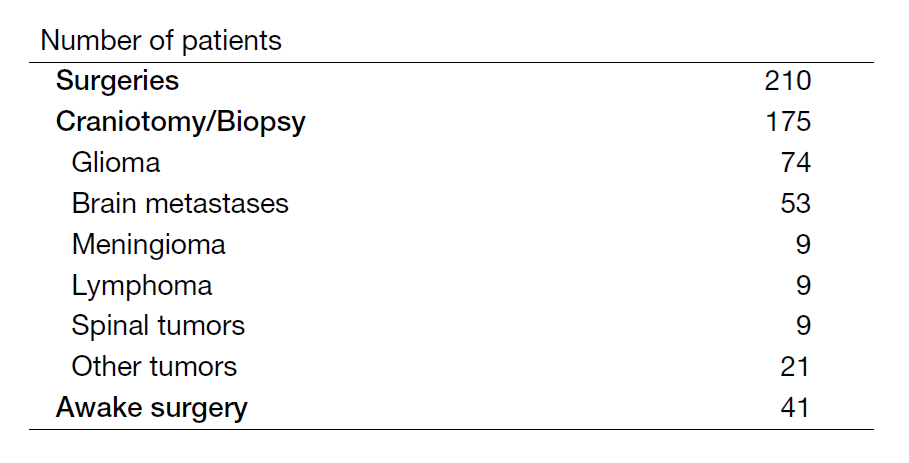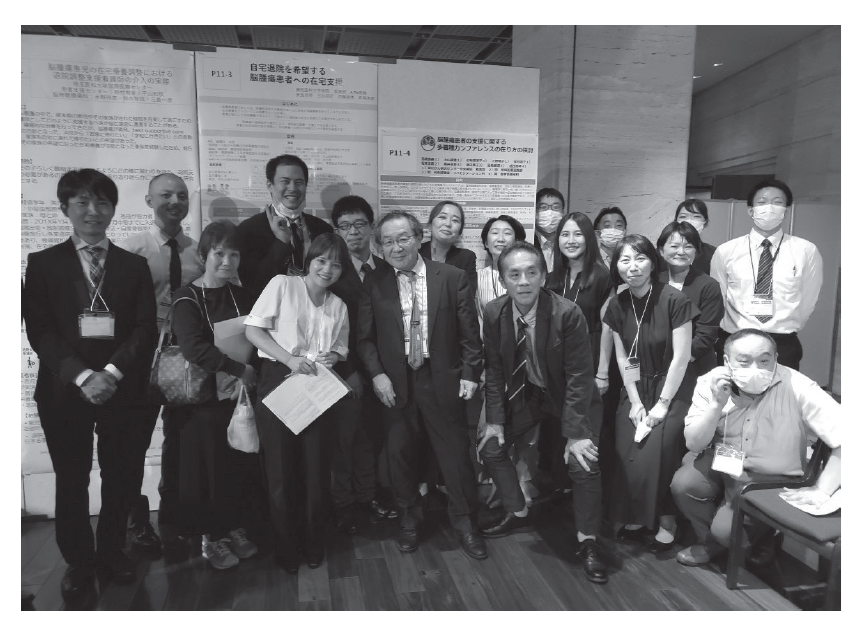Annual Report 2023
Department of Neurosurgery and Neuro-Oncology
Yoshitaka Narita, Masamichi Takahashi, Makoto Ohno, Shunsuke Yanagisawa, Sho Osawa, Takahiro Tsuchiya, Shohei Fujita
Introduction
We treat patients with primary and metastatic brain tumors. Approximately 300 patients were admitted and 175 craniotomies for tumor removal and biopsy were performed in 2023 including 74 gliomas, 53 brain metastases, 9 primary CNS lymphomas, and 9 meningiomas (Table 1). The extent of tumor removal was visualized on an intraoperative MRI in real time, contributing to safer and more precise surgery. Intraoperative monitoring with motor- and sensory-evoked potential (MEP and SEP) recordings and preoperative functional MRI and MR tractography were also used to preserve patient neurological function. Awake surgeries for 41 cases were also performed, particularly for the removal of gliomas near the speech center. Patients with malignant brain tumors underwent postoperative radiotherapy and chemotherapy. New intraoperative MRI was updated.
To perform a more effective chemotherapy regimen, molecular biological studies for drug resistance and growth factors, cell kinetic studies on individual tumors and several clinical trials are ongoing.
Table 1. Surgical cases for brain tumors

The Team and What We Do
A weekly conference on the treatment of patients with brain tumors is held with doctors from the Department of Radiation Oncology and Pathology and the Division of Brain Tumor Translational Research. Usually, 10-15 patients are hospitalized, and 3 or 4 of them undergo surgical treatment every week. Patients with malignant brain tumors receive postoperative radiotherapy and chemotherapy. Statistical analysis revealed that surgical removal of as much of the tumor as possible yielded better survival rates even for most malignant glioblastomas, which usually recur immediately after surgery without radiotherapy. Concomitant use of chemotherapy is considered to enhance the anti-tumor effect of radiotherapy.
The decision on the indication for surgery of metastatic brain tumors is not a simple one. Multiplicity of brain metastasis, the stage of the primary malignancy and the patient performance status should be carefully considered.
Research Activities
Gene expression profiles in malignant gliomas are analyzed to determine specific genes that influence the effects of chemotherapy and radiation therapy in cooperation with the Division of Brain Tumor Translational Research, the National Cancer Center Research Institute. The determination of the methylation status of O6-methylguanine-DNA methyltransferase (MGMT) and the mutation of IDH1/2 and TERT are also performed to predict the prognosis of patients with malignant gliomas within one week after surgery. Clinical sequence for 113 gene mutations, chromosomal abnormalities, and MGMT promoter methylation was performed within one month after surgery.
Clinical Trials
The Japan Clinical Oncology Group (JCOG)-Brain Tumor Study Group was organized in 2003 and multi-institutional randomized controlled trials are performed. "Randomized phase III study for unresectable WHO Grade II astrocytoma with radiotherapy alone or chemoradiotherapy with temozolomide (JCOG1303)", Phase III randomized study for grade III gliomas (JCOG1016), and phase III study for glioblastoma (JCOG1308, JCOG1703, JCOG1910 and JCOG2209) are ongoing. These studies, under the surveillance of the JCOG, aim to establish a standard protocol for treating malignant brain tumor patients. Moreover, a proper methodology for performing randomized studies will be established in the field of neuro-oncology.
An investigator-initiated phase I/II clinical trial of metformin and temozolomide for newly-diagnosed glioblastomas is performed under AMED grants.
Education
Our department plays a pivotal role in the JCOG-Brain Tumor Study Group and the brain tumor registry of Japan, and we have conducted many clinical trials and run the brain tumor registry. We educate many neurosurgeons and oncologists about surgical techniques of awake craniotomy and intraoperative MRI and the effective usage and adverse effects of many chemotherapeutic agents for malignant brain tumors.
Future Prospects
Malignant brain tumors, especially glioblastoma, still have worse prognosis among cancers. We continually strive to eradicate these brain cancers through a variety of clinical work and research.
List of papers published in 2023
Journal
1. Mishima K, Nishikawa R, Narita Y, Mizusawa J, Sumi M, Koga T, Sasaki N, Kinoshita M, Nagane M, Arakawa Y, Yoshimoto K, Shibahara I, Shinojima N, Asano K, Tsurubuchi T, Sasaki H, Asai A, Sasayama T, Momii Y, Sasaki A, Nakamura S, Kojima M, Tamaru JI, Tsuchiya K, Gomyo M, Abe K, Natsumeda M, Yamasaki F, Katayama H, Fukuda H. Randomized phase III study of high-dose methotrexate and whole-brain radiotherapy with/without temozolomide for newly diagnosed primary CNS lymphoma: JCOG1114C. Neuro-oncology, 25:687-698, 2023
2. Kawauchi D, Ohno M, Honda-Kitahara M, Miyakita Y, Takahashi M, Yanagisawa S, Tamura Y, Kikuchi M, Ichimura K, Narita Y. Clinical characteristics and prognosis of Glioblastoma patients with infratentorial recurrence. BMC neurology, 23:9, 2023
3. Nishikawa R, Yamasaki F, Arakawa Y, Muragaki Y, Narita Y, Tanaka S, Yamaguchi S, Mukasa A, Kanamori M. Safety and efficacy of tumour-treating fields (TTFields) therapy for newly diagnosed glioblastoma in Japanese patients using the Novo-TTF System: a prospective post-approval study. Japanese journal of clinical oncology, 53:371-377, 2023
4. Toda Y, Kobayashi E, Kubota D, Miyakita Y, Narita Y, Kawai A. A retrospective analysis of the prognosis of Japanese patients with sarcoma brain metastasis. Cancer medicine, 12:9471-9481, 2023
5. Sugino H, Satomi K, Mori T, Mukai Y, Honda-Kitahara M, Matsushita Y, Ichimura K, Narita Y, Yoshida A. High-grade neuroepithelial tumor with EP300::BCOR fusion and negative BCOR immunohistochemical expression: a case report. Brain tumor pathology, 40:133-141, 2023
6. Imaizumi J, Shida D, Boku N, Igaki H, Itami J, Miyakita Y, Narita Y, Takashima A, Kanemitsu Y. Prognostic factors associated with the transition in treatment methods for brain metastases from colorectal cancer. International journal of clinical oncology, 28:1043-1053, 2023
7. Kawauchi D, Ohno M, Miyakita Y, Takahashi M, Yanagisawa S, Omura T, Yoshida A, Kubo Y, Igaki H, Ichimura K, Narita Y. Consulting a neurosurgeon upon initial medical assessment reduces the time to the first surgery and potentially contributes to improved prognosis for glioblastoma patients. Japanese journal of clinical oncology, 53:1027-1033, 2023
8. Arakawa Y, Narita Y, Nagane M, Mishima K, Terui Y, Yonezawa H, Asai K, Fukuhara N, Sugiyama K, Shinojima N, Aoi A, Nishikawa R. Karnofsky Performance Status and quality of life in patients with relapsed or refractory primary CNS lymphoma from a phase I/II study of tirabrutinib. Neuro-oncology advances, 5:vdad109, 2023


